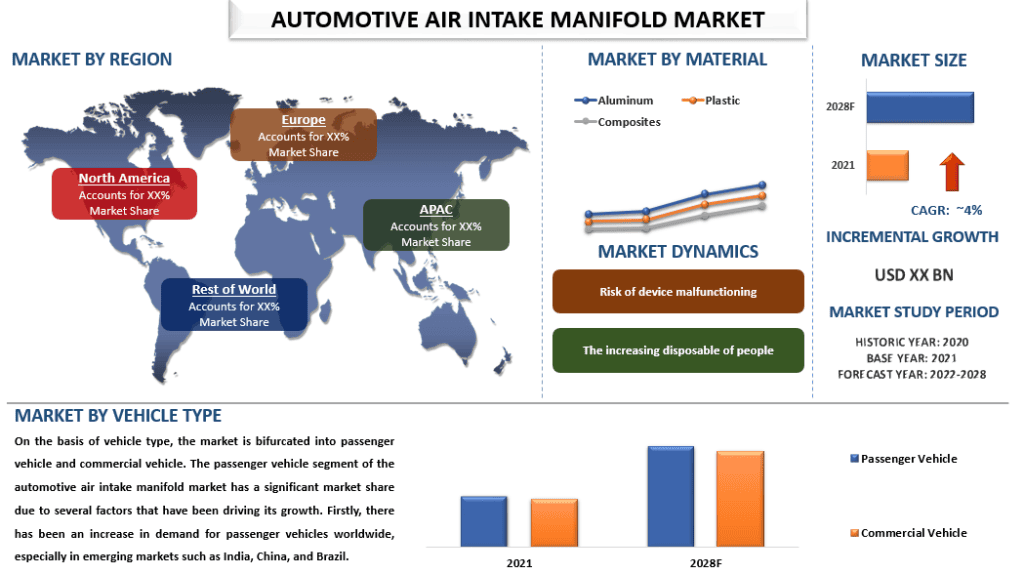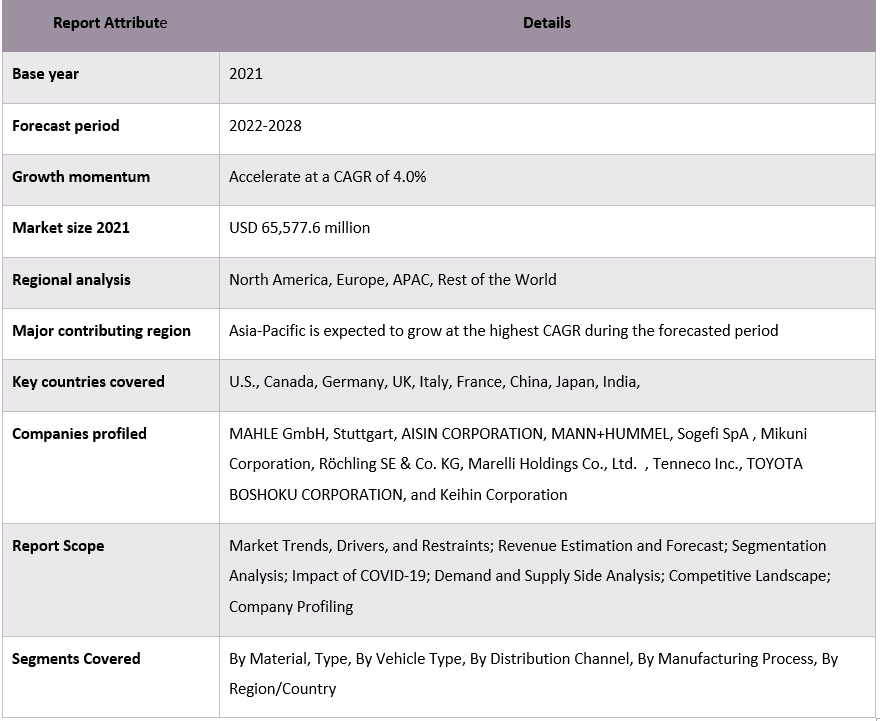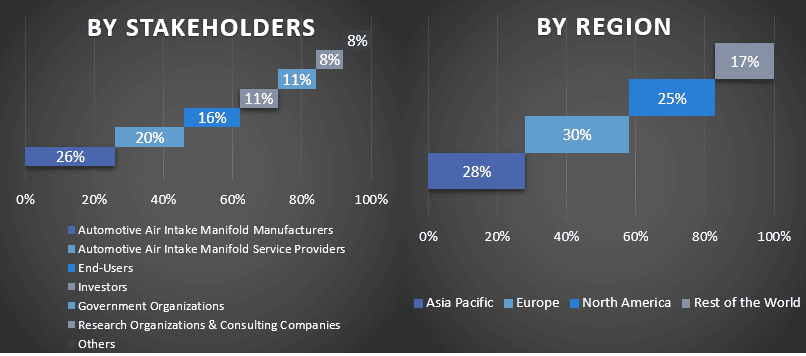- Home
- About Us
- Industry
- Services
- Reading
- Contact Us
Automotive Air Intake Manifold Market: Current Analysis and Forecast (2022-2028)
Emphasis on Material (Aluminum, Plastic and Composite); Type (Single Plane Manifolds, Dual Plane Manifolds, Hi-Ram Manifolds, Efi Manifolds, And Supercharger); Distribution Channel (OEM and Aftermarket); Manufacturing Channel ( Injection Moulding and Casting ); Region/Country.

The Automotive air intake manifold market was valued at USD 65,577.6 million in 2021 & is expected to grow at a CAGR of 4.0% from 2022-2028. The market is being driven by several factors, including the increasing demand for fuel-efficient vehicles, stricter government regulations on emissions, and the growing popularity of electric vehicles. One recent development in the market has been the increasing use of lightweight materials in the construction of air intake manifolds. This has been driven by the need to reduce vehicle weight and improve fuel efficiency, as well as the desire to improve performance. Companies such as Mann+Hummel and Mahle have been at the forefront of this trend, introducing new products that use advanced materials such as carbon fiber and thermoplastics.
Another trend in the market has been the growing popularity of electric vehicles. As more and more consumers make the switch to EVs, there is a growing need for air intake manifolds that are specifically designed for electric drivetrains. This has led to the development of new products by companies such as BorgWarner and Continental, which offer high-performance air intake systems designed specifically for electric vehicles.
In addition to these developments, there have been a number of other new products and innovations in the market in recent years. For example, in 2019, MAHLE introduced a new line of air intake manifolds that are designed to improve fuel efficiency and reduce emissions. Similarly, in 2020, Mann+Hummel launched a new air intake manifold that is specifically designed for hybrid and electric vehicles, and features a number of advanced technologies such as active flow control and integrated sensors.
Overall, the global automotive air intake manifold market is poised for continued growth in the coming years, driven by a range of factors including the increasing demand for fuel-efficient vehicles, stricter government regulations on emissions, and the growing popularity of electric vehicles. With new products and innovations being introduced by leading companies in the industry, it is an exciting time for this market.
Some of the major players operating in the market MAHLE GmbH, Stuttgart, AISIN CORPORATION, MANN+HUMMEL, Sogefi SpA, Mikuni Corporation, Röchling SE & Co. KG, Marelli Holdings Co., Ltd. , Tenneco Inc., TOYOTA BOSHOKU CORPORATION, and Keihin Corporation. Several M&As along with partnerships have been undertaken by these players to facilitate customers with hi-tech and innovative products/technologies.
Insights Presented in the Report
“Amongst vehicle type, the commercial vehicle segment has been experiencing a significant growth rate.”
Based on vehicle type, the market is segmented into passenger vehicle and commercial vehicle. The commercial vehicle segment has been experiencing a significant growth rate in the automotive air intake market due to several factors. Firstly, the increasing demand for transportation services, particularly in emerging economies, has led to a surge in commercial vehicle sales. This growth in the commercial vehicle market has resulted in a corresponding increase in the demand for automotive air intake systems. Secondly, governments across the world have been implementing stricter emission norms, which require commercial vehicles to meet higher standards of fuel efficiency and emissions control. This has resulted in the need for more advanced air intake systems, which can help improve engine performance and reduce emissions.
“Amongst manufacturing process, the casting segment has a significant growth rate in the automotive air intake market.”
By manufacturing process, the market is bifurcated into injection molding and casting. Among these, the casting segment has a significant growth rate in the automotive air intake market due to several reasons. Firstly, casting technology allows to produce complex shapes and designs that cannot be achieved through other manufacturing methods. This provides greater flexibility in design and engineering, which is particularly important in the automotive industry where aerodynamics and engine performance are critical. Additionally, casting allows to produce lighter weight components, which can improve fuel efficiency and reduce emissions.
“North America dominated the automotive air intake manifold market in 2021.”
North America dominates the global automotive air intake manifold market for several reasons. One of the primary drivers of this dominance is the large number of automotive manufacturers and suppliers that are based in the region. Another driver of the North American automotive air intake manifold market is the increasing demand for fuel-efficient vehicles. This has been driven by a range of factors, including rising fuel prices and stricter government regulations on emissions. As a result, there is a growing need for advanced air intake manifold systems that can improve engine efficiency and reduce emissions. One recent development in the North American market has been the increasing use of lightweight materials in air intake manifold construction. Companies such as BorgWarner and Magna have been at the forefront of this trend, introducing new products that use advanced materials such as carbon fiber and thermoplastics. This has helped to reduce vehicle weight and improve fuel efficiency.
In addition to these developments, there have been several other new products and innovations in the North American automotive air intake manifold market in recent years. For example, in 2019, K&N Engineering introduced a new line of air intake systems that are designed to improve engine performance and increase horsepower. Similarly, in 2020, AEM Induction Systems launched a new air intake manifold that is designed to reduce air restriction and improve engine performance.
Automotive Air Intake Manifold Market Report Coverage

Reasons to buy this report:
- The study includes market sizing and forecasting analysis validated by authenticated key industry experts.
- The report presents a quick review of overall industry performance at one glance.
- The report covers an in-depth analysis of prominent industry peers with a primary focus on key business financials, product portfolios, expansion strategies, and recent developments.
- Detailed examination of drivers, restraints, key trends, and opportunities prevailing in the industry.
- The study comprehensively covers the market across different segments.
- Deep dive regional level analysis of the industry.
Customization Options:
The global automotive air intake manifold market can further be customized as per the requirement or any other market segment. Besides this, UMI understands that you may have your own business needs, hence feel free to connect with us to get a report that completely suits your requirements.
Table of Content
Research Methodology for the Automotive Air Intake Manifold Market Analysis (2022-2028)
Analyzing the historical market, estimating the current market, and forecasting the future market of the global automotive air intake manifold market were the three major steps undertaken to create and analyze the adoption of automotive air intake manifold in major regions globally. Exhaustive secondary research was conducted to collect the historical market numbers and estimate the current market size. Secondly, to validate these insights, numerous findings and assumptions were taken into consideration. Moreover, exhaustive primary interviews were also conducted, with industry experts across the value chain of the global automotive air intake manifold market. Post assumption and validation of market numbers through primary interviews, we employed a top-down/bottom-up approach to forecasting the complete market size. Thereafter, market breakdown and data triangulation methods were adopted to estimate and analyze the market size of segments and sub-segments of the industry pertains to. Detailed methodology is explained below:
Analysis of Historical Market Size
Step 1: In-Depth Study of Secondary Sources:
Detail secondary study was conducted to obtain the historical market size of the automotive air intake manifold market through company internal sources such as annual reports & financial statements, performance presentations, press releases, etc., and external sources including journals, news & articles, government publications, competitor publications, sector reports, third-party database, and other credible publications.
Step 2: Market Segmentation:
After obtaining the historical market size of the automotive air intake manifold market, we conducted a detailed secondary analysis to gather historical market insights and share for different segments & sub-segments for major regions. Major segments are included in the report as material, type, vehicle type, distribution channel, and manufacturing process. Further country-level analyses were conducted to evaluate the overall adoption of testing models in that region.
Step 3: Factor Analysis:
After acquiring the historical market size of different segments and sub-segments, we conducted a detailed factor analysis to estimate the current market size of the automotive air intake manifold market. Further, we conducted factor analysis using dependent and independent variables such as product, technology, and end-users of the automotive air intake manifold market. A thorough analysis was conducted for demand and supply-side scenarios considering top partnerships, mergers and acquisitions, business expansion, and product launches in the automotive air intake manifold market sector across the globe.
Current Market Size Estimate & Forecast
Current Market Sizing: Based on actionable insights from the above 3 steps, we arrived at the current market size, key players in the global automotive air intake manifold market, and market shares of the segments. All the required percentage shares split, and market breakdowns were determined using the above-mentioned secondary approach and were verified through primary interviews.
Estimation & Forecasting: For market estimation and forecast, weights were assigned to different factors including drivers & trends, restraints, and opportunities available for the stakeholders. After analyzing these factors, relevant forecasting techniques i.e., the top-down/bottom-up approach were applied to arrive at the market forecast for 2028 for different segments and sub-segments across the major markets globally. The research methodology adopted to estimate the market size encompasses:
- The industry’s market size, in terms of revenue (USD) and the adoption rate of the automotive air intake manifold market across the major markets domestically
- All percentage shares, splits, and breakdowns of market segments and sub-segments
- Key players in the global automotive air intake manifold market in terms of products offered. Also, the growth strategies adopted by these players to compete in the fast-growing market
Market Size and Share Validation
Primary Research: In-depth interviews were conducted with the Key Opinion Leaders (KOLs) including Top Level Executives (CXO/VPs, Sales Head, Marketing Head, Operational Head, Regional Head, Country Head, etc.) across major regions. Primary research findings were then summarized, and statistical analysis was performed to prove the stated hypothesis. Inputs from primary research were consolidated with secondary findings, hence turning information into actionable insights.
Split of Primary Participants in Different Regions

Market Engineering
The data triangulation technique was employed to complete the overall market estimation and to arrive at precise statistical numbers for each segment and sub-segment of the global automotive air intake manifold market. data was split into several segments & sub-segments post studying various parameters and trends in the areas of the product, technology, and end-users in the global automotive air intake manifold market.
The main objective of the Global Automotive Air Intake Manifold Market Study
The current & future market trends of the global automotive air intake manifold market were pinpointed in the study. Investors can gain strategic insights to base their discretion for investments on the qualitative and quantitative analysis performed in the study. Current and future market trends determined the overall attractiveness of the market at a regional level, providing a platform for the industrial participant to exploit the untapped market to benefit from a first-mover advantage. Other quantitative goals of the studies include:
- Analyze the current and forecast market size of the automotive air intake manifold market in terms of value (USD). Also, analyze the current and forecast market size of different segments and sub-segments
- Segments in the study include areas of the material, type, vehicle type, distribution channel, and manufacturing process.
- Define and analysis of the regulatory framework for the automotive air intake manifold
- Analyze the value chain involved with the presence of various intermediaries, along with analyzing customer and competitor behaviors of the industry
- Analyze the current and forecast market size of the automotive air intake manifold market for the major region.
- Major countries of regions studied in the report include Asia Pacific, Europe, North America, and the Rest of the World
- Company profiles of the automotive air intake manifold market and the growth strategies adopted by the market players to sustain in the fast-growing market.
- Deep dive regional level analysis of the industry
Related Reports
Customers who bought this item also bought










